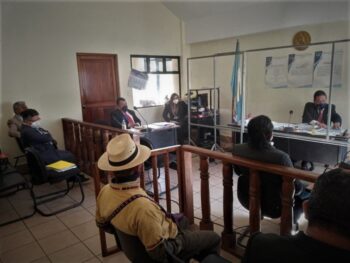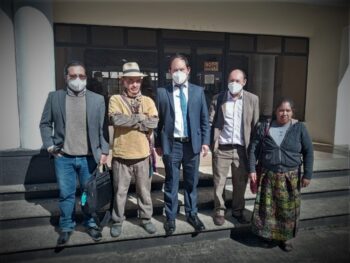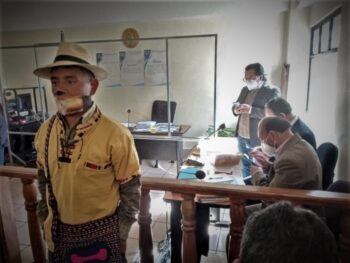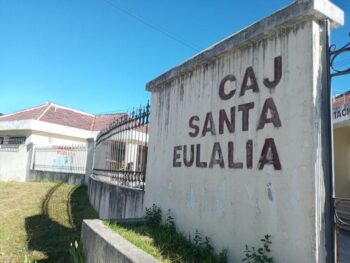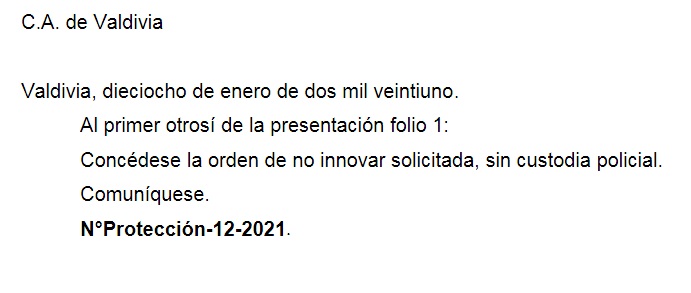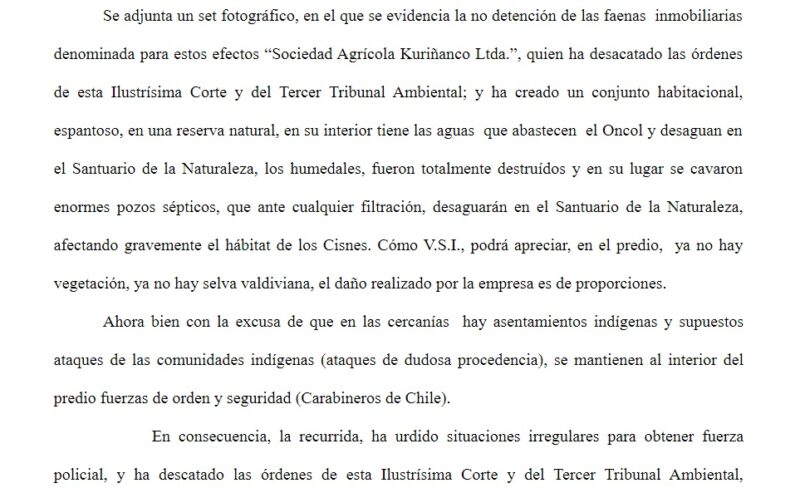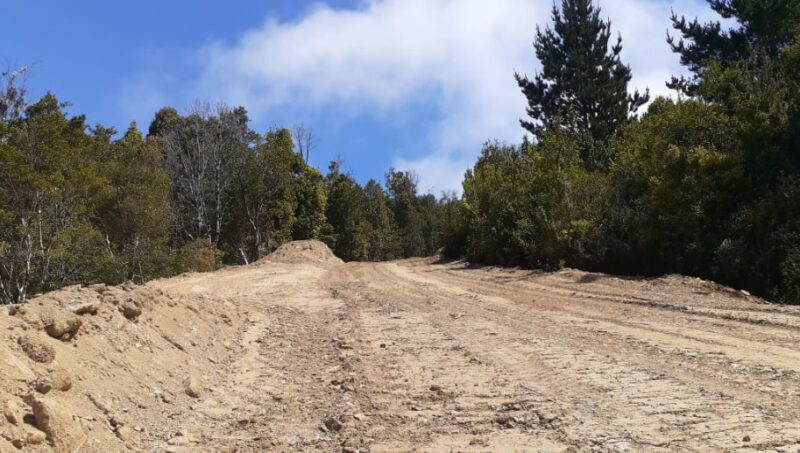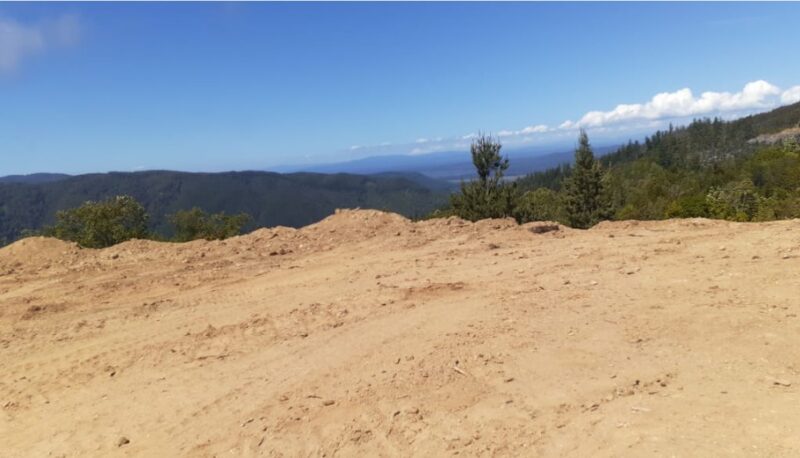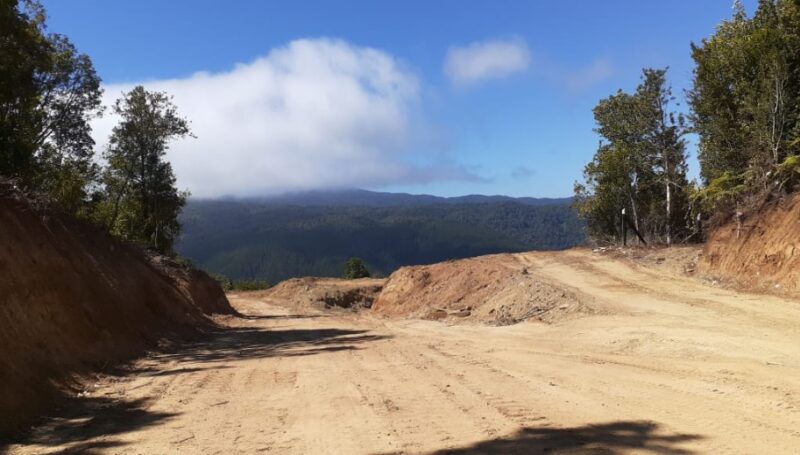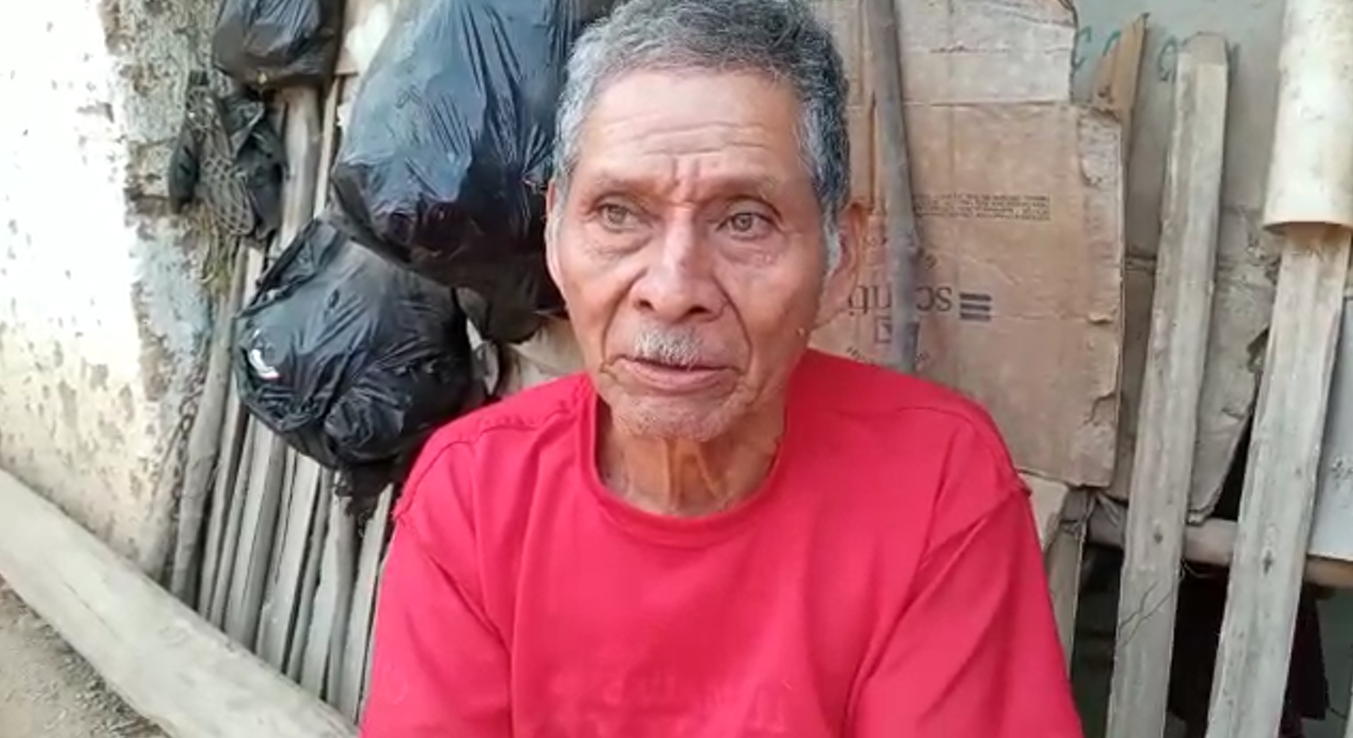Sorry, this entry is only available in Español. For the sake of viewer convenience, the content is shown below in the alternative language. You may click the link to switch the active language.
Desde la aparición pública del EZLN en enero de 1994, el gobierno mexicano en sus tres niveles (federal, estatal y municipal) ha promovido, organizado, financiado y alentado a distintos grupos paramilitares para que ataquen a la población civil zapatista.
En este contexto, la comunidad de Moisés Gandhi, ubicada en el crucero Cuxuljá, municipio autónomo de Lucio Cabañas, (del municipio oficial de Ocosingo) ha sufrido recientemente varios ataques por parte del grupo paramilitar ORCAO (Organización Regional de Cafeticultores de Ocosingo).
– El pasado 22 de agosto, la ORCAO atacó con armas de grueso calibre, quemó y saqueó las bodegas de café del Centro de Comercio “Nuevo Amanecer del Arcoiris”, ubicado en el crucero de Cuxuljá.
– El pasado 8 de noviembre, la ORCAO secuestró a Félix López Hernández, base de apoyo zapatista de la comunidad de Moisés Gandhi a quien golpearon, amarraron y encerraron sin agua ni alimentos hasta el día 11 noviembre en que fue liberado.
– El lunes 18 de enero de 2021, la ORCAO disparó contra la comunidad de Moisés Gandhi. El ataque comenzó a las 1530 hrs (hora de México) y hasta las 1800 hrs. hubo disparos en contra de las casas de la comunidad. 170 disparos de calibres grandes y 80 de calibres chicos.
– El miércoles 20 de enero de 2021, a las 16:00 horas, nuevo ataque armado contra la comunidad, con calibres grandes y chicos. A las 22:30 horas de nuevo ataque con armas de fuego contra la comunidad.
– El jueves 21 de enero de 2021, nuevos ataques con disparos contra las casas de la comunidad de Moisés Gandhi. Primero a las 00:30 horas y posteriormente desde las 02:10 horas hasta las 02:55 horas.
Se calcula que el número de atacantes es de al menos 20 personas. Todas pertenecientes a la organización paramilitar ORCAO de las comunidades de San Antonio, Cuxuljá, San Francisco y 7 de febrero.
(Toda la información se puede consultar con el Centro de Derechos Humanos Fray Bartolomé de las Casa, Chiapas, México)
Por todo lo anterior, denunciamos la escalada paramilitar contra las comunidades zapatistas, así como la complicidad del gobierno federal, estatal y municipal en la misma.
Digan lo que digan, declaren lo que declaren, firmen los documentos que firmen, los malos gobiernos están financiando, promoviendo y respaldando los ataques de grupos paramilitares, como el de la ORCAO, contra la población civil. Son criminales pues, aunque piensen que no, se ensucian sus manos con la sangre de hombres, mujeres, niños y ancianos que viven pacíficamente en todas esas comunidades atacadas por los paramilitares.
¡VIVA LA LUCHA POR LA VIDA DE LAS COMUNIDADES ZAPATISTAS!
¡ALTO A LOS ATAQUES PARAMILITARES!
¡ALTO A LA MUERTE QUE SIEMBRAN LOS TRES PODERES DE GOBIERNO!
Para enviar tu firma, escribe un correo a info@lumaltik.org
Organizaciones, colectivos, individuos, firmantes:
ESTADO ESPAÑOL
Centro de Documentación sobre Zapatismo -CEDOZ-
Asamblea de Solidaridad con México (ASMEX)
Yretiemble Madrid
Madrid43 Ayotzinapa
Comité de Solidaridad con América Latina (COSAL)
CGT
Olga Clavería
Juan Carlos Capanegra
Sara Bergasa
Teresa González de Chávez
Enrique Bauzá Ferré
Cristina Asenjo Berzal
Anticapitalistas
Pallasos en Rebeldía de Galicia, Madrid
Tomas Ibáñez
Assemblea 8M d’Elx
Mujeres Supervivientes
Solidaridad con el pueblo Mexicano (Málaga)
Federico Noriega González
Asociación memorialista “la Desbandá”
CNT Fraga
TRAWUNCHE MADRID – Coordinación de Apoyo al Pueblo Mapuche
Fundación de los comunes
CATALUÑA
Adhesiva, Espai de Trobada i Acció
Ass. Solidaria Cafè Rebeldía-Infoespai, Barcelona
Jaime Pastor
Manuel Garí Ramos
Juan Carlos Capanegra
FIRMES – Federación Internacional de Resistencia Migrante en España
Maria Antònia Arnau Puigvert
Grup de consum agroecològic Pinyol Vermell
Pallasos en Rebeldía de Catalunya
Adherentes a la Sexta Barcelona
Libélula Verde ed.
PAÍS VASCO
TxiapasEKIN
Lumaltik Herriak
ELA-EUSKAL-SINDIKATUA
Zapatisten Lagunak
Begoña Zabala
Bakea eta Elkartasuna-Fundación Paz y Solidaridad
Mundubat fundazioa
Paz con Dignidad- Bakea eta Duintasuna
Observatorio de Multinacionales en América Latina (OMAL)
A Planeta
Bizilur
AZET Etxebizitza Sindikatua (Bilbao)
PAIS VALENCIÁ
Perifèries del Món
ITALIA
Tatawelo
Ya Basta Milano
YAKU
Associazione Jambo Italia
CIAC ( centro immigrazione asilo cooperazione internazionale)
Collettivo Caffè Malatesta (Torrefacion Artesana Autogestionada)
LINA SORTINO
Germana Villetti
Elena Giuliani
CSOA Gabrio, Torino
La Pirata
Nodo Solidale Italia
Enzo Traverso
Fuorimercato, autogestione in movimento
Associazione Jambo- commercio equo Fidenza Italia
Casetta Rossa
Partido de la Refundacion Comunista – Izquierda Europea
Centro sociale intifada Empoli
Associazione Ya Basta! Moltitudia Roma
Proyecto 20ZLN
CSOA ZAPATA
Zanchetta, Aldo
Zanchetta, Brunella
Associazione Yaku
COBAS Confederazione dei Comitati di Base
Non una di meno Torino
Comitato Piazza Carlo Giuliani
Rete Antifascista Roma Sud
Associazione TATAWELO
Marquito Buscemi
Giulia Trobbiani
Potere al Popolo
Ex-Opg Occupato – Je’ So Pazzo
CHIPRE
Colectivo Ramona
NORUEGA
Chiapasgruppa LAG
Susana Norman
GRECIA
Grupo Calendario Solidario con l@s Zapatistas
Chispa de Solidaridad con l@s Zapatistas y los Pueblos Indingenas, Atenas
Asamblea libertaria autoorganizada Paliacate Zapatista, Grecia
Espiral de solidaridad-semilla de resistencia, Grecia
Confrontacion, grupo de comunist@s (Grecia)
Guerreros del agua (Tesalónica, Grecia)
Jará Tzouma,aigio, Grecia
Domni Zef, atenas, Grecia
Kostas Svolis, atena, Grecia
Agie Kyriakidi,Tesalonica, Grecia
Eugenia Michalopoulou, Atenas, Grecia
Stavros Stavrides, Atenas, Grecia
Τasula Cheppaki, Tesalonica, Grecia
Niovi Diatsigou, Atenas, Grecia
Cooperativa de trabajo “To Kivotio”, Ciudad de Rethymno, Isla de Creta
Christy Petropoulou, Mytilene, Grecia
Aris Mermigkas, Mytilene, Grecia
Comunidad Cooperativa de Autosuficiencia “ApoKoinou”, Heraklion, Crecia
Michael Kabitis Athens Grecia
Spyridoula Trakaki, Tesalonica, Grecia
Dimitra Souliou, Atenas, Grecia
Betty Mourtzi, Athenas, Grecia
Ocupación Anarquista UTOPIA A.D. Komotini Grecia
Escuela comunitaria “el arbolito que se convertirá en bosque”, Tesalonica, Grecia
Suburban Crew, Tesalonica, Grecia
Dimitris S., Tesalónica, Grecia
La Red Vacia(Teoria, Utopia,Emparia, Artes Efimeras)
Ciclo Vacío – Miembro de la Federación Anarquista
Lydia Lada Athens Greece
Despina Anastasopoulou, Mitilene, Grecia
Iro Panagiotopoulou,aigio,Grecia
Sonia Vlachou, Ioannina, Grecia.
Sergio Kompogiorgas, Marmari, Grecia
ΙΑΤΡΕΙΟ-ΦΑΡΜΑΚΕΙΟ ΚΟΙΝΩΝΙΚΗΣ ΑΛΛΗΛΕΓΓΥΗΣ ΙΛΙΟΥ ΑΤΤΙΚΗΣ
Elena Gogou, Drama, Grecia
Obscura Creative Cooperative Lab, Ciudad de Rethymno, Isla de Creta
Dimitra Karachotziti, Argos Greece
A.P. BARUTI, Veria, Greece
Yanna Papadopoulou, Atenas, Grecia
Douka Evangelia, Athens, Grecia
Palaistidis Ntinos, Atenas, Grecia
La Cuña Centro político, social y cultural autogestionado de la ciudad de Tebas
Stathis Serafeim, Thiva, Grecia
Maria Kolozi, Samos, Grecia
Grupo político “Camino Libertario” (Grecia)
Zervas Dimitrios, Nea Smyrni, Athens, Grecia
Geppetto Cooperativa, Ciudad de Rethymno, Isla de Creta
Αθηνά Βακαλοπούλου,Γαργαλιάνοι, Μεσσηνία
Vasilis Kokkotis Athena Grecia
Achilleas Diogenis Athena Grecia
Christopher Koutelieris grecia
Kouniaki Evgenia, Grecia
Jristos Karystinos, Grecia
Maria Vamvoukli, Mytilene, Grecia
Zoi Trantalidou, Atenas, Grecia
Xanthopoulou Maria, Atenas, Grecia
ΘΕΟΦΙΛΟΣ ΒΑΝΔΩΡΟΣ ΑΝΤΙΑUTHORITARIAN MOVEMENT ATHENS
Movimiento Antiautoritario de Tesalónica (Grecia)
Club deportivo Apáleftos (Grecia)
Centro social “Respiro di libertà” (Grecia)
NoBorders Community, medios libres (Grecia)
Movimiento Antiautoritario de Larisa (Grecia)
Local Autónomo de la ciudad de Xanthi , Grecia
Μovimiento Αnti-autoritario de Atenas (Grecia)
Espacio Social Libre Nosotros (ciudad de Atenas, Grecia)
Club Laboral Nea Smyrni (municipio de Nea Smyrni, ciudad de Atenas-,Grecia)
Alterthess, medio alternativo, Thessaloniki, Grecia
Zografia Karekou, Athina, Grecia
NoBorders Greece
Vagelis Hokshilato Hokshilato
Ocupa de “Jardín Botánico” (Espacio Social Libre) Grecia
Gesto – Movimiento Antiautoritario de Ioánina (Grecia)
Ioannis Dellatolas, Tinos, Grecia
Cooperativa de trabajador@s Viome,Thessaloniki,Grecia
Despina Amarantidou, Tesalonica, Grecia
Stelios Stampoulidis, Tesalonica, Grecia
Kourniati Katerina, Chalkis Evia, Grecia
Giorgos Papachristodoulou,Grecia
Editorial de Extranjer@s (Tesalonica, Grecia)
Mbambis Nanakoudis,Hortiatis,Grecia
Κινηση Πολιτων Χορτιατη,Grecia
infolibre.gr – cooperative media for independent information (medio cooperativo para la información
Las ediciones de colegas
Cooperativa de trabajo- tienda de comercio solidario LACANDONA, Atenas, Grecia
Ανεξάρτητη Πηλιορείτικη Ομάδα Δράσης (Σταγιάτες)
ARGENTINA
Colectiva corazón del tiempo
Juan Wahren
Asamblea por la vida de Chilecito (La Rioja- Argentina)
ALEMANIA
Colectivo gata-gata
Tres gatas – producción en colectivo
Citizens Summons
Gruppe B.A.S.T.A.
red Ya-Basta-Netz
Campaña cafe mesoamericana
Edo Schmidt
Partner Suedmexikos e.V.
Anselm Jappe
AUSTRIA
Colectivo libertad
FRANCIA
Union syndicale Solidaires
Philippe Corcuff
Odille Laurie
Yvon Le Bot
Ruben Navarro
Jerome Baschet (franco mexicano)
Christine Pellicane
Compagine Tamerantong
Comité de Solidaridad con los Pueblos de Chiapas en Lucha, Paris
Solidaire 09
MUT Vitz 13
Colectivo Granos de arena
Franck Gaudichaud
Michael Lowy
Collectif Paris-Ayotzinapa
Comité en solidaridad con los pueblos indigenas des las Americas (CSIA-Nitassinan)
Grupo de apoyo à Leonard Peltier (LPSG – France)
espoir Chiapas esperanza Chiapas
Compagnie Jolie Môme
Gabriel Gau
Philippe Maymat
Olivier Besancenot
Ya basta!
Les Gilets Jaunes de Saillans
Americasol (Red Escargot)
Collectif Chiapas-Ariège
LA MILPA associacion civil
Dr Jean Baptiste BAJON
LE KIOSK
Emancipation Collective
Jeanne Studer
Angélique Sapolin
Claudine Baschet
Guy Perinelli
Collectif Surnatural/Surnatural Orchestra
Pauline Torrubia
Tommaso Cornali
Comité Populaire Quartier Latin
L’association Couserans-palestine
Couserans-Palestine (09-Francia)
Bato Loko & la Revolu-soN
CÒRSEGA
Corsica Internaziunalista
ESTADOS UNIDOS
Sabino Espinoza
Greg Ruggiero
Lita RIAS
Americasol (Red Escargot)
Iris Crystal Viveros Avendaño
Chris Rodriguez
Border Agricultural Workers Project
El Kilombo
Colectivo Internacional de Solidaridad de la FL/FL International Solidarity Collective
Green Party of Monmouth County NJ.
Russell Abedeen
Geri Rhodes
SUIZA
Collettivo Zapatista di Lugano
Barfuss Kollektiv
BELGICA
Quinoa
Groupe CafeZ
Casa Nicaragua
Eric Toussaint
Bernard Duterme
Geert Carpels
Bernard Duterme
Actrices et acteurs des Temps Présents
Le DK
RAZB
Bernard Duterme
BRASIL
Roberto Lima
Pallasos en Rebeldía de Brasil
Leandro Fernandes Sampaio Santos
Jonnefer Barbosa
CHILE
Carmen Castillo
Edagrs Martínez Navarrete
Tierra y Libertad para Arauco – Wallmapu
Andrés Figueroa Cornejo
Ximena Cuadra Montoya
Amanda Molina
URUGUAY
Raúl Zibechi
Ernesto Herrera
Correspondencias de Prensa
Jorge Pedro Zabalza
COLOMBIA
Vilma Almendra
Manuel Rozental
Colectivo Proyecto Ceis
Medios al derecho – MAD
Plataforma comunicativa popular Como la cigarra
Andrés Felipe Ortiz Gordillo
FINLANDIA
Colectivo Armadillo
PALESTINA
Festiclown Festival Internacional de Clown de Palestina.
REPÚBLICA CHECA
Black Seeds
GUATEMALA
Ileana Valenzuela
Consejo de Pueblos K’iche’s por la defensa de la vida madre naturaleza tierra y territorio.
EGIPTO
Vane Trepp
MÉXICO
Desarrollo Económico y Social de los Mexicanos Indígenas A. C. ( DESMI A.C.).
Centro de Derechos Humanos Fray Bartolomé de Las Casas A.C.
Espacio de Lucha contra el Olvido y la Represión (ELCOR/Chiapas)
Centro de Derechos de la Mujer de Chiapas (CDMCH)
Colectivo Flor de Asfalto
Red de Resistencia y Rebeldía Puerto Vallarta
Colectivo Caracol de la Vida Morelos – Red de Resistencia y RebeldíaMorelos, México
Colectiva Autónoma de Colaboración Social
Radio zapatista sudcaliforniana (BCSUR, México)
Promedios de Comunicación Comunitaria
Nodo de Derechos Humanos
Rigoverto Albores Serrano
Coralia Pérez CabañasMérida, Yucatán, México
Diana Itzu Gutiérrez Luna
Heriberto Paredes, periodista y fotógrafo independiente
Oswaldo Gianelli, escritor
Miriam García del Saz
Nodo Solidale Messico
Antonio Gritón
Gilberto López y Rivas
Cynthia Ventura
Bruno Baronet
Cátedra Intercultural Carlos Montemayor
Rosalva Aida Hernandez
Ana Lidya Flores Marin
Francisco Morfin Otero (México)
Raúl Delgado Wise (México)
Margara Millan (México)
Álvaro Salgado (México)
Jorge Alonso Sánchez
Alicia Castellanos Guerrero (México)
Fernanda Navarro(México)
Magdalena Gómez (México)
Salvador Diaz Sánchez (México)
Sylvia Marcos (México)
Luisa Riley (México)
Ariel García (México)
Carlos Antonio Aguirre Rojas (México)
María Eugenia Sánchez Díaz (México)
Eduardo Almeida Acosta (México)
Gustavo Esteva (México)
Miguel Radilla
Espacio de Lucha contra el Olvido y la Represión (ELCOR/Chiapas)
Abel Torres Elizondo
Adriana Camacho
Adriana Hernández Segura
Adriana María Henao Gaviria
Agrupación Un Salto de Vida
Agustín Bernal Inguanzo
Alan Anwar de la Cruz Gutiérrez
Aldo Cortes Pérez
Alejandra Briones Herrera
Alejandra Ferniza López
Alejandra Rosas Armenta
Alejandro Rodríguez Andrade
Alicia Beatríz Cruz Camarena.
Alicia Escamila Jaime
Alicia Romo de la Rosa
Aline González Balcázar
Allan Christian Humbert Muñiz
Alma Guadalupe Melgarito Rocha
Alma Kullick Lackner
Alma Leticia Borrego
Alma Michelle Salazar Vargas
Amaranta Cabrera Pimentel
Ana Celia Colio Auceta
Ana Karen Flores Flores
Ana Laura Vázquez Caso
Ana Lucía Pérez del colectivo Zurcando el Temporal
Ana Valentina López De Cea
Ana Victoria Padilla Velasco
Ana Virgen Solano
Ana Yamile Ventura Gómez
Analí Escobar Ibáñez
Andrés Gerardo Valdes Braña
Andrés Ismael Galindo Solís
Ángel Sulub
Anselmo David García Cazares
Antonio “Gritón”
Araceli Elizabeth Alvarado García
Araceli Ledesma G.
Araceli Osorio
Argelia Rentería
Ariadne Alvarado Uribe
Armando Soto Baeza
Arturo Espinoza
Arturo Guerrero
Asamblea de Defensores del Territorio Maya Múuch Xíinbal.
Asociación Cívica Mexicanos Unidos
Ateneu Libertário a Batalha da Várzea
Aurelio Morales Posselt
Aurora Macías Rea
Azucena Rodríguez Gómez
Batallones Femeninos
Beatriz Camarena Carbajal
Beatriz Vela Arizmendi
Bertha María Rayas Camarena
Bertha Melendez, cantante
Betzabé Rivera López
Blanca Aimee Cabrera Cuellar
Blanca Imelda Pedroza Gallegos
Bonifacia Hernández Flores
Brenda Elicet Giles Miranda
Brenda Ximena Salazar Barrón
Brenda Yoban López Sandoval
Brian Machado García
Carla Daniela Arce Ramos
Carlos Durand Alcántara
Carmen Edith Flores Gutiérrez
Cecilia Granados Salgado
Cecilia Margarita Cuevas Dávila
Centro Cultural Carretera 45 A.C
César Sánchez Palacios
Christian Eduardo Gutiérrez Cortés
Christian Sánchez Muñoz
Cindy Vanessa Olvera Camacho
Cipactli Yruegas Ruvalcaba
Círculo de Estudios y Autoconsciencias Feministas
Círculo de lectura sin cables
Claudia Muñiz
CNTE Nuevo León
Coalición de Ex-trabajadoras (es) y Trabajadoras (es) de la Industria Electrónica Nacional ( sede en Jalisco)
Colaboratorio Deshumanizante
ColectivA SucuLENtaZ
Colectiva: Mujeres tejiendo resistencias
Colectivo Acción Directa Autogestiva
Colectivo Aequus,Promoción y Defensa de Derechos Humanos
Colectivo Ariles del Caracol
Colectivo Caracol de la Vida Morelos
Colectivo Cuaderno Común
Colectivo de familia La Ruda
Colectivo de Jóvenes de la Nueva Central de Trabajadores
Colectivo de La Ezkina Libertad
Colectivo de lectura
Colectivo de Profes en la Sexta
Colectivo Gavilanas
Colectivo Los hijos del maiz pinto
Colectivo Mujeres Tierra AC
Colectivo Paso Doble de Apoyo al Congreso Nacional Indígena – Concejo Indígena de Gobierno.
Colectivo Transdisciplinario de Investigaciones Críticas COTRIC
Colectivos del Sur, Xochimilco
ColectivoTejiendo Luz
Comité Agua y Vida del antiguo Valle de Xuchitlán
Comité Estudiantil Metropolitano (CEM)
Comunidad Antihistoria
Comunidad Circular AC
Comunidad de Tlanezi Calli
Comunidad de Xochitlanezi
Concejo Nacional Urbano y Campesino CNUC/Tlaxcala
Cooperativa de Consumo Comandanta Ramona
Coordinación de Familiares de Estudiantes Víctimas de Violencia
Cristian Leyva
Cristina González Machado
Cristina Gonzalez Serna
Cristina Peralta Casillas
Cuerpos Parlantes
Daniel Sandoval Cervantes, México, ANEICJ; UAM-C.
Daniela Amenic Alvarado, Amenic MC Poética,
Dante Khalil Ibarra Pichardo
David Loarca Calderón
David Villa Real Zavala
Delia Angelly González Ochoa
Delia Elizabeth Delgado Rivera
Dennise Berenice Robles Marrón
Diana Betanzos
Diana Gabriela Arangure Quevedo
Diana Idalia Montiel Espinosa
Edgar Salvador Sanabria
Edgar Sánchez Beltrán
Ediciones Ají
Edmundo García García
Efrén Mila López
El Aguante
El Árbol Proyecto Cooperativa
El Bordado de Ramona
Eladio Abundiz Guadian coordinador Nacional de FAT
Elena Ferrer Amarillas
Elena Katzenstein Ferrer
Elizabeth Mora Romo
Elizabeth Sáenz-Ackermann
Emerson Carlos Muñiz Soto
Emilio Angulo Perkins-Puebla
Enrique Ávila Carrillo
Enrique Gabriel Salinas Enriquez
Erika Charles Niño
Erika Isabel Varela Rodríguez
Ernesto Santillan Anguiano
Escuela para Defensoras en derechos humanos y ambientales Benita Galeana A. C
Esmeralda Erandi Aldaco Lemus
Esteban Moises Chavez Almanza
Eva Gutiérrez Ortega
Eva Nelli Chaire Mendoza
Fabián Guerrero
Faustino Celestino Martínez
Felipe Willys Ortiz
Fernando Bedolla
Fidel Soto Aragon
Formación y Capacitación. AC
Francisco Humberto Peregrina
Francisco Javier Panduro Baltazar
Francisco Javier Tapia Hernández
Frente Nacional Ni Una Menos
Gabriela Elizabeth Madrigal Mora
Gabriela Fuentes
Gabriela Huerta Castillo
Gabriela Ibáñez Cornejo
Gabriela López Ávila
Georgina Navarro Núñez
Gerardo Díaz Pérez
Gerardo Roberto Flores Peña
Gerardo Rolando Rincón Ávila
Germán Licea Vázquez
Gloria Iris de la Peña Lopez
Gpe. Sandra de la Garza Vargas
Grupo de Trabajo No Estamos Todxs
Guadalupe Ortega Rodríguez
Guadalupe Pérez Rodríguez,
Guadalupe Varela Esparza
Guardianes y Guardianas del río Metlapanapan
Gustavo Alvarez
Heather Dashner Monk
Hector Abraham Borrego Duran
Héctor de Jesús Aguilar Farias
Henry Forero-Medina
Hijas de su maquilera madre
Hilda Teresa Ramírez Alcantara
Horacio Rodriguez Castro
Hugo Alejandro Rojas López
Hugo Molina
Iris Adriana Hernández Rivera
Isabel Gutierrez Paredes
Isabel Margarita Magaña Gómez
Isis Samaniego
Israel Alejandro Mora Navarro “Pirra”
Ivan Alonzo Cuevas
Iván Ramírez Pérez
Ivanovich Michel Luna
J. Jesús María Serna Moreno
Jacobo Alan Sandoval Vázquez
Jaime Oscar Macías Torres
Jaime Renán Ramírez Zavala
Jaime Sánchez Beltrán
Jazmin Rendon Sánchez
Jeniffer Zoe Borrego Duran
Jesús Alfonso Soto Gastelum
Jesus Antonio Rubio Sandoval
Jesús Eduardo Carrillo Guerrero
Jesus Espinoza Mendez
Jesús Israel Rojas López
Jonathan Sibraim Macotela Aldrete
Jorge Eduardo Arce Ramos
Jorge Ismael Dávila Ruvalcaba
Jorge Villa Medina
José Alejandro Barón Hernández
José Ángel Bucio Pacheco
José Antonio Arce Acosta
José Antonio Olvera
José Antonio Salgado Maldonado
José de jesús Vargas Ponce
Jose Eloy Cota Ortiz
José Luis Aguilar Alatorre
José Luis García Valero
Jose Manuel Lomelin
José Ramón Segurajáuregui Pérez
José Salgado Barragan
Josefina Torres Aguilera
Josué Vergara
Juan Antonio Acosta Ríos
Juan Fernando Escobar Ibáñez
Juan Manual Noriega Ojeda
Juan Pablo Nava Gomez
Juan Pablo Sánchez Castellanos
Juan Pedro Fernández Hernández
Juan Romo Nuñez
Judith de la Mora Ruiz
Juieta García
Juventud Comunista de México
Karen Abril Vera Paredes
Karla Concha Olán
Karla Cristina Herrera Meléndez
Karla Edna García Rocha
Karla Navarro Menchaca
La RRR Jo’ también suscribe compas (Mérida, Yucatán)
La Voz del Anáhuac
Laura Carranza Leal
Laura Díaz Ortiz
Laura Estivali Varela Esparza
Laura Rocha
Lengualerta
León Fierro Resendiz
Leonardo Cardona García
Leonardo Rendón Nava
Leopoldo Chassin Ramírez
Leopoldo Rayas Camarena
Leslie Acevedo Sánchez
Lilibeth Paulina Ochoa de Dios
Lizeth Capulín Arrellano
London Mexico Solidarity
Lorena Hernández Escalona
Luis Octavio Vázquez Huitrón
Luiz Miguel Mendonça Gonçalves
Luz Verónica Gallegos Cantú
Lylia Palacios
Ma de la Luz Morales Rivera
Marco A. Velázquez Navarrete
Marco Antonio Bonilla Sarabia
Margarita Gastelum Ramirez
Margarita Robertson
Margaritas Morales Rivera
María Alejandra Bucio Pacheco
María Alejandra Ruíz Cervantes
Maria Cristina Vidotte Blanco Tarrega
María de Fátima Prieto Razo
María de la Luz Núñez Cham
Maria De Los Angeles Covarrubias Garcia
Maria de Los Angeles Romo Hurtado
María de Lourdes Villegas Morales
Maria del Carmen Briseño
María del Carmen Martínez Genis
María del Rosario Aguilar Pizaña
María del Rosario Pérez Navarro
María del Rosío Cázares Blanco
María Elena Ortiz García
Maria Guadalupe Moedano
María Guadalupe Pámanes Conejo
María Isabel Domínuez Herrera
Maria Magdalena Aranda Delgado
María Sagrario Anta Martínez
María Teresa Sánchez Beltrán
María Trinidad Gutiérrez Ramírez
María Usabel Domínguez Herrera
Mariana Barreda Marin
Mariana Escobar Ibáñez
Mariana Lourdes Troncoso
Mariana Olivo Espinoza
Mariana Rivera
Maribel Aguilar Medina
Maricarmen Victoria
Mario López Lopez
Marisol Sánchez Cortés
Marlen Alicia Cano Morales
Marta De Cea
Martha Alicia Pérez
Martha Elena Welsh Herrera
Martha Gabriela Valdéz Romero
Martha Gonzélez Lázaro
Martha Molina Avila
Martín de la Rosa Trejo
Maye de la Rosa
Mayra Yadyra Vega Flores
Mercedes Adriana Portillo Elías
Mercedes González
Meza de Café Zapatista UAM-Iztapalapa
Miguel Ángel Zenón
Miguel Gil
Miguel Valdés Villarreal M
Miriam Álvarez Enríquez
Mirna Valdés viveros poeta
Miryam Ariadna Concha Olan
Mitzi Zuleica Herrera González
Modesto López, productor discográfico y documentalista
Moisés David Hermosillo
Mónica Aguado García de Alba
Mónica Lorena Murillo Acosta
Mónica Márquez
Movimiento Internacional ChiaPaz
Municipio Autónomo Otomi de San Francisco Tlalcilalcalpan
Nadia Constanza Hernández Díaz.
Nahui Olin Castelo Torres
Nancy Monserrat Rostro Bonifás
Nancy Raquel Olvera de la Rosa
Ninett Torres Villareal
Norma Angélica Parra Hernández
Norma Ávila Báez
Nueva Central de Trabajadores
Obeja Negra
Omar Israel Reyes Mendoza
Oreandy Maldonado
Orlando Garcìa Silva
Oscar Alarcón escritor
Óscar Barragán Guerrero
Pablo Betancourt Castro
Pablo Vicente Gómez Lauría
Paloma Esperanza Aguilar Morales
Paloma Villalobos
Partido Revolucionario de las y los Trabajadores
Paulina Munguía
Paulina Navarro Núñez
Paulino Alvarado Pizaña
Pedro Pachaguaya Yujra Asociacion Departamental de Antropologos de La Paz. Bolivia
Ramón Eduardo Juárez Sánchez
Ramsés Hernández Chávez
Raquel Herrera
Raquel Rodríguez Ramírez
Raquel Soto Salazar
Raúl Falcón Martínez
Rebeca Aguayo Sánchez
Rebeca Paulina Malo Castañeda
Red de Apoyo Iztapalapa Sexta
Red de Mujeres que Luchan “Porque Acordamos Vivir”
Red de Rebeldía y Resistrenzas Puebla
Red de Resistencia y Disidencia Sexual y de Género
Red de Resistencia y Rebeldía Morelos
Red de Resistencia y Rebeldía Tijuana
Red de Resistencia y Rebeldía Tlalpan
Red de Resistencia y Rebeldía Xalapa
Red de Resistencia y Rebeldía Zacatecas
Red derecho, lucha de clases y reconfiguración del capital.
Red Regional de Resistencias y Rebeldías Noroeste
Red Resistencia y Rebeldía de Querétaro
Red Universitaria Anticapitalista
Renato Alejandro González Guerra
Ricardo Vázquez González
Roberto Briceño Figueras
Roberto Castro Maldonado
Roberto Rodriguez Rangel
Rocío Ivonne Ramírez Martínez
Rocío Servín Jiménez
Rodrigo Reyes Carranza
Rojos y Anarquistas Skinheads – Guadalajara
Rosa Isela Bastida Torres
Rosa María García García
Rosa María Jurado Muñoz
Rosa Paulina Resendiz Flores.
Rosaura López De Cea
Rosendo Ramírez Sánchez
Rubén Morales Farías
Ruby Hernández Vicente
Salvador Fong Fierro
Samira Campos Cuevas
Santiago Aguilar Castañeda
Sarai Rangel Quillo
Sashenka Fierro Resendiz
Sebastián Arroy
Sección 9 del SINTS de Oaxaca
Selene de la Rosa Dueñez
Sergio Armando Flores Carranza
Sergio Luna Morán de Azcapotzalco
Shakti Arte Escena S.C.
Sigifredo Esquivel Marin
Silvana A. Figueroa Delgado
Silvia Leticia García Alvarado
Silvia Resendiz Flores
Silvia Zuñiga padilla
Sinai Carolina Fuentes Cebreros
Sindicato Mexicano de Electricistas
Siria Garibay Marrón
Soledad Saavedra Chascomús
Sonia Cuevas Cabrera
Sonia Leticia Macías Morales
Susana Valdéz de Alba
Tania Gallaga Hernández
Tania Martínez Báez
Tania Paloma Hernández Ramírez
Tania Violeta Dávila Ramírez
Unión Campesina Zapatista del Sur
Unión popular Apizaquence Democrática e Independiente Upadi.
Valeria Aguirre
Valeria Herrera
Valeria Lyssette Valadez Hernández
Vania Machado Hernandez
Veronica Bucio Pacheco
Victor López Ruelas
Victor Manuel Cabrera Morelos
Virginia Rivera
Voices in Movement (Mexico, USA, France)
Yinue Flores de Santiago
Yoshiro Cruz Alonso
Raúl Romero, CDMX, México
Argelia Guerrero, CDMX, México
Unión popular Apizaquence Democratica e Independiente Upadi.
Etcétera Errante Colectivo SJF
Jimena Soria Tello
Carolina Torreblanca
Daniela Philipson García
Mónica Meltis Véjar
Lucía Riojas Martinez
Gabriela Jáuregui
Ecos del Caracol, colectiva independiente CDMX
Yolanda Molina Reyes
Nicole Huete Guevara
Ixchel Cisneros Soltero
Nora Hinojo
Patricia Carranza Rodríguez
Simón Alberto Sánchez Ortega
Inés Carrasco Scherer
Daniela Tejas Miguez
Mariana Zaragoza
Pandeo-Espacio Cultural Independiente
Nelly Cesar
Marcela Zendejas
Margarita Nuñez
Luciana Kaplan
Estanislao Froylán
Nadia de mond
Inés Durán Matute
Rocío Noemi Martínez
Camilo Valqui
BRIGADA RICARDO FLORES MAGÓN
Ana María Vera Smith
Colectiva Rebeldas
Julio Garduño
Adán González
Víctor Manuel Escobar Pineda
La Otra Cultura Inlakech
Radio Zapatista Sudcaliforniana
Brigada Ricardo Flores Magón
Colectivo Disidentxs Teatro
Adalberto Vicente Estrada Ortiz Monasterio
Adriana del Moral
Alberto Ubaldo Montenegro Padilla
Alejandra López Lujano
Alejandro Martínez
Amanda Mata Rojo
Ana Isabel Mar García
Ana Sabina Ojeda Rich
Andrea Angulo Valdez
Angel Noe Hernández Toscano
Aníbal Mendez Martínez
Antonio Castillo González
Antonio esparza rodriguez
Areli Zaragoza Ruíz
Argelia Ramírez Cerda
Armando Abreu Vidaurri
Asamblea General de Trabajadores
Bárbara de la Garza Pineda
Brigadas Emiliano Zapata de México
Carla Paola Sarabia González
Chris Rodríguez
Christopher Cesar Llamas Burgueño
Christopher Rishel
Claudia Patricia Ávila Gaxiola
Clínica de Heridas
Colectiva Magdaleonas Teatro de las Oprimidas
Colectivas Rebeldas
Colectivo CNI-Totonacapan
Colectivo Entretejiendonos
Colectivo Los Tlacuilos
Colectivo Renovador Estudiantil Autónomo (UNAM)
Compas Arriba!
COMUNARR AC
Coordinadora de Colonias Ecatepec
Coordinadora de estudiantes y colectivxs de la Facultad de Derecho-UNAM
Cristian Villarruel Gonzalez
Cristina Abrajan Cabanillas
Derecho a la rebelión
Diana Cecilia Rodríguez Ugalde
Diana Laura Arce Martinez
Edgar Leonel Nuñez Preciado
Edgar Méndez Salas
Eduardo Ramírez Varela
Efraín Ávila Delfín
Elena Sofía Rich González
Elizabeth Hernández Nava
Elizabeth Paulina Segura Limón
Emma Lourdes Medrano Amaya
Emmanuel Galavíz
Ena Miroslava Martínez Pérez
Enver Gerardo Martínez Hernández
Erika Lozano
Erika Soto Villalobos
Esther Pérez Aboytes
Fabricio Sánchez Granados
Félida Deyanira Cázares Sánchez
Felipe Martínez
Fernando Resendiz
Francisco Barrios “Mastuerzo”
Franco Aguirre Benotti
Frente de Consumidores FEDECO
Galeón Pirata Centro Cultural Independiente
Gerardo Morales
Germán A. Cravioto Batarse
Gilberto Zúñiga
Griselda Gamez Escobedo
Grupo de teatro Mitote
Grupos de la Asamblea de Barrios de la Ciudad de México
Guadalupe Guerrero Dávila
Hermelinda Espinoza Contreras
Horacio Almanza Alcalde
Ignacio Pamplona Leaño
Iván Marentes Rosas
Ivone Ayala
Jacob Cristóbal Pérez
Jaqueline Astorga Rios
Javier Iván Talamantes Tovar
Jesús Gutiérrez
Johnatan Guerrero Rentería
José Alejandro Barón Hernández
José Francisco Hernández Ochoa
José Francisco Palma Aguirre
José Manuel Fuerte García
Juan Jaime Loera González
Juan José Barcenas Casas
Juanita Rincón Lorenzo
Karen Estefania Cervantes Mendoza
KloakasKomunikantes
Kurt McLean
La Casa del Centro
La Red Digna Rabia Coyoacán
La Resistemcia L.A.
Lesvy Rivera Calderón
Lucia Lara Rivas
Lucia Linsalata
Luis Raúl Pérez Herrera
Luz Gabriela Durán López
Ma del Pilar López D.R.
Ma. De los Angeles Ortiz Sánchez
Manuel Mariano Matías
Marco Habib Zuñiga Diaz
Margarita Inostroza Ríos
María del Consuelo Ortíz Leyva
María Isabel Quezada de la Torre
María Matilde Salazar Rodríguez
Mario Alberto Rubio Ramírez
Martín Gara Ololiuki
Melissa Funes Pérez Montemayor
Melissa Lara Flores
Miguel Ángel Cardenas Garza
Miguel Ángel Radilla
Miguel Chávez Sánchez
Mónica Fernández de Córdova
Nadia Xochiquetzalli González Briseño
Norma Alicia Palma Aguirre
Norma Cruz González
Norma Patricia Vale Gómez
Ofelia Pastrana Medina
Olga Olaez Ortega
Olinka Gil Amezcua
Orlando Reynoso Orozco
Oscar Arturo González Espinoza
Pablo Ortiz Gurrola
Paloma Rosales Casas
Paola Contestabile Freire
Paola Mercedes Martínez Ramírez
Patricia Gonźalez
Paul Enrique Nava Durán
Polo Loya
Priscilla Alexa Macias Mojica
Rafael Ortega Sinaloa
Raúl Romero
Red binacional de mujeres que luchan
Red de Rebeldía y Resistencia Ajmaq
Red de Resistencia y Rebeldía Orizaba, Altas Montañas
Ricardo Javier Juarez Estrada
Roco Pachukote
Rosa Adriana Segura
Semillero de investigación Torbellino de Nuestras Palabras
Sexta Teatrito
Silvia Rocío López
SINÉ AC
Solidarios de la Voz del Amate
Tania Flores de la Torre
Tania Yocelin Rosales Covarrubias
Tanya Elizabeth Méndez Luévano
Tatiana Amor
Universidad de la Tierra
Urdidumbre Audiovisual
Veronica Martinez Ledesma
Víctor Manuel Ojeda Chávez
Victoria Ochoa Murra
Vincent Jacquemin
Walter S. Salazar García
Zoraida Balcázar Cedillo
Cynthia Osorno Sánchez
Priscila Pacheco Castillo
Colectivo de Grupos de la Asamblea de Barrios de la Ciudad de México(CG-ABCM)
Brigadas Emiliano Zapata de México (BEZ-MÉX)
Carlos Nava Lancaster
Thalía Ortega Matehuala
María José Secco Terra
H.I.J.O.S.
Sergio Rodríguez Lascano
Natanael Murillo Calvo
La Otra Salud
Centro de Capacitación Integral para Promotores Comunitarios, A.C,
Víctor Sánchez
Gilberto Piñeda Bañuelos
ORGANIZACIONES DE ÁMBITO INTERNACIONAL – OTROS
Mujeres y Disidencias de la Sexta en la Otra Europa y Abya Yala
Indigenous Anarchist Federation – Federación Indígena Anarquista
Never Again 88, Europa
Amado Arturo Espinosa Guerrero
Carlos Javier Ortega Hoyos
Leonardo Vieira
Susan Beattie




